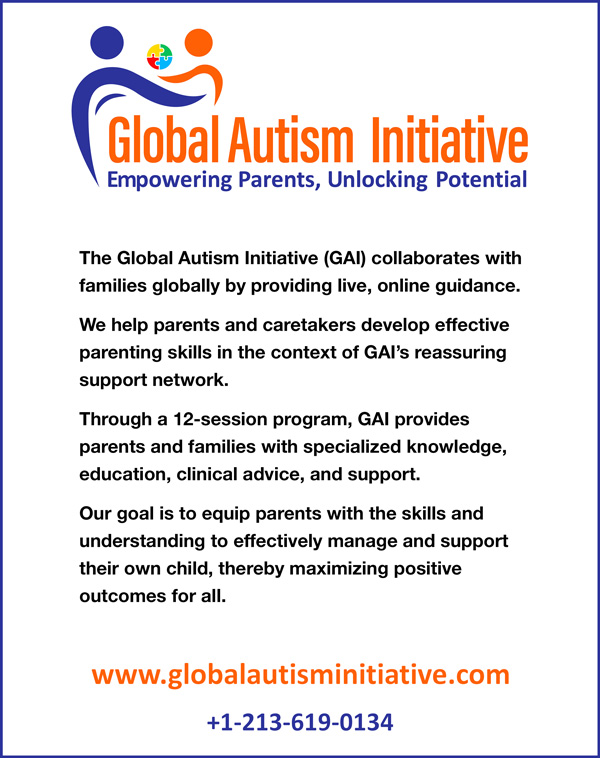“Phenomenology or phenomenological psychology, a sub-discipline of psychology, is the scientific study of subjective experiences. It is an approach to psychological subject matter that attempts to explain experiences from the point of view of the subject via the analysis of their written or spoken words” (Wikipedia).
In a world where access to autism services remains uneven, the Global Autism Initiative (GAI) has emerged to offer a beacon of hope for families across the globe. Born out of a commitment to bridge the gap between autism resources and families in need, GAI stands as a testament to the power of education, empathy, and the unbreakable bond between parents and their children on the autism spectrum.
Uniting the World for Autism Support
Autism Spectrum Disorder (ASD) knows no geographical boundaries. Families across continents grapple with the challenges of raising children diagnosed with ASD. However, not all families have equitable access to vital resources and services. This is where the Global Autism Initiative steps in. Created to address the disparities in autism support services, GAI is dedicated to extending education, guidance, and empathy to families who might otherwise be left without the tools they need to empower their children’s growth.
Education at the Core
At the heart of the Global Autism Initiative lies a commitment to education. GAI recognizes that empowering parents and primary caregivers with knowledge is key to unlocking the potential of children with ASD. The GAI offers professionally facilitated online coursework that covers a comprehensive range of topics, from the basics of autism to Applied Behavior Analysis (ABA) techniques. Armed with this knowledge, parents are better equipped to foster a supportive and conducive environment for their children’s development.
No doubt, people who pursue careers as helpers for special needs individuals mean well and strive to make a positive impact in the lives of the clients they serve. As a corollary, it is generally recognized that to be an effective helper, one must genuinely care about the person to be helped. But it’s not nearly as simple as it sounds. Once the helper and helpee find themselves in a treatment setting, introductions and a “getting to know one another ”dialogue proceed and roles, ideally, begin to diverge. A good helper will adopt a benign, but intense, listening posture thereby making it increasingly comfortable for the helpee to fully share details and history of the issues underlying their help seeking behavior. The non-verbal behavior of the helper as a focused listener is critical, but not sufficient, for the helpee to experience the genuineness of the helper’s concern and accurate grasp of key presenting issues. Via a slightly forward body lean, some head nodding and occasional smiling, and the helper’s succinct and creative use of paraphrase and summaries, the helpee comes to experience that helper understands critical information leading toward formulation of an intervention plan.
As referenced in the definition of phenomenology (above), it is somewhere between ideal and essential for professionals supporting individuals with autism to be able to grasp the point of view of the autistic individual and their caretakers and, subsequently, to teach these skills to the caretakers.
The traditional behavior health disciplines of psychiatry, psychology and social work have enjoyed a head start in designing methods for fostering therapeutic relationships, bonding, etc. For example, Carl Rogers, an American Psychologist, was best known for the development of person-centered psychotherapy. This treatment approach flourished in the 1950’s and 1960’s and largely involved active listening and summarization of the client’s thoughts and feelings. Rogers’ work led to the objectification of Active Listening Skills. Subsequently, the work of Goldstein, Sprafkin, and Gershaw on Structured Learning Therapy (1976), operationalized key interpersonal and social skills and successfully taught these skills to psychiatric patients.
However, today’s graduate level training curricula in Applied Behavior Analysis (ABA) have largely focused on understanding of Autism Spectrum Disorder, methods of intervention for skills development and reduction of maladaptive behaviors and data collection. Techniques for developing effective therapeutic relationships have largely been absent in BCBA and RBT-type training programs leaving this vital area to chance. To address this consequential gap in training, the onboarding process for Behavior Specialists at GAI includes both didactic and experiential training in Active Listening Skills.
Empathy: The Pillar of Connection
Beyond education, GAI underscores the importance of building empathic relationships with children on the spectrum. It’s not just about mastering techniques; it’s about understanding and connecting with the unique experiences and needs of each child. Active listening, a technique taught by GAI, empowers parents to truly tune in to their children’s emotions and communication styles. This form of understanding becomes the cornerstone of stronger relationships and more effective support systems.
Cultural Sensitivity: Erasing Barriers
Recognizing the diversity of the global community, GAI takes an extra step to ensure that cultural and linguistic barriers are minimized. The Support Specialists are not only highly trained and experienced Qualified Autism Support Practitioners and Behavior Analysts but are also located within the families’ own countries. This localization strategy ensures that the support provided is not just professional but also tailored to the specific cultural contexts of each family.
Howard Savin, PhD, is CEO and Founder, and Michael Reid, PhD, PsyD, QABA, is Chief Operating Officer of the Global Autism Initiative. For further information, email hsavin@globalautisminitiative.com.
References
Goldstein, A.P., Sprafkin, R.P., & Gershaw, N.J. (1976). Structured Learning Therapy: Training for Community Living: Psychotherapy; Theory, Research & Practice. 13(4), 374-377







